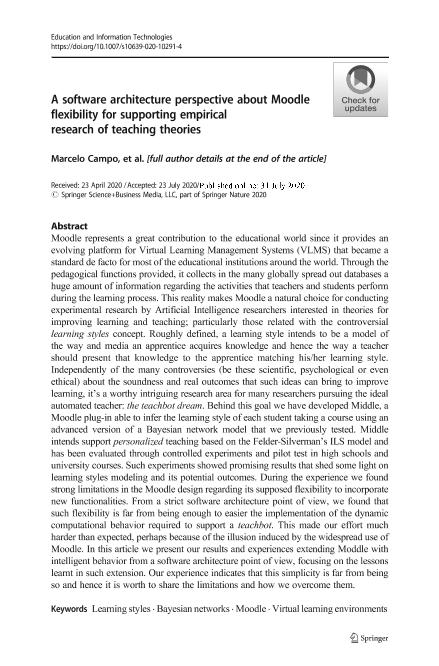Mostrar el registro sencillo del ítem
dc.contributor.author
Campo, Marcelo Ricardo

dc.contributor.author
Amandi, Analia Adriana

dc.contributor.author
Biset, Julio César

dc.date.available
2020-11-04T23:00:25Z
dc.date.issued
2020-07
dc.identifier.citation
Campo, Marcelo Ricardo; Amandi, Analia Adriana; Biset, Julio César; A software architecture perspective about Moodle flexibility for supporting empirical research of teaching theories; Springer; Education and Information Technologies; 7-2020; 1-26
dc.identifier.issn
1573-7608
dc.identifier.uri
http://hdl.handle.net/11336/117658
dc.description.abstract
Moodle represents a great contribution to the educational world since it provides an evolving platform for Virtual Learning Management Systems (VLMS) that became a standard de facto for most of the educational institutions around the world. Through the pedagogical functions provided, it collects in the many globally spread out databases a huge amount of information regarding the activities that teachers and students perform during the learning process. This reality makes Moodle a natural choice for conducting experimental research by Artificial Intelligence researchers interested in theories for improving learning and teaching; particularly those related with the controversial learning styles concept. Roughly defined, a learning style intends to be a model of the way and media an apprentice acquires knowledge and hence the way a teacher should present that knowledge to the apprentice matching his/her learning style. Independently of the many controversies (be these scientific, psychological or even ethical) about the soundness and real outcomes that such ideas can bring to improve learning, it’s a worthy intriguing research area for many researchers pursuing the ideal automated teacher: the teachbot dream. Behind this goal we have developed Middle, a Moodle plug-in able to infer the learning style of each student taking a course using an advanced version of a Bayesian network model that we previously tested. Middle intends support personalized teaching based on the Felder-Silverman’s ILS model and has been evaluated through controlled experiments and pilot test in high schools and university courses. Such experiments showed promising results that shed some light on learning styles modeling and its potential outcomes. During the experience we found strong limitations in the Moodle design regarding its supposed flexibility to incorporate new functionalities. From a strict software architecture point of view, we found that such flexibility is far from being enough to easier the implementation of the dynamic computational behavior required to support a teachbot. This made our effort much harder than expected, perhaps because of the illusion induced by the widespread use of Moodle. In this article we present our results and experiences extending Moddle with intelligent behavior from a software architecture point of view, focusing on the lessons learnt in such extension. Our experience indicates that this simplicity is far from being so and hence it is worth to share the limitations and how we overcome them.
dc.format
application/pdf
dc.language.iso
eng
dc.publisher
Springer
dc.rights
info:eu-repo/semantics/openAccess
dc.rights.uri
https://creativecommons.org/licenses/by-nc-sa/2.5/ar/
dc.subject
BAYESIAN NETWORKS
dc.subject
LEARNING STYLES
dc.subject
MOODLE
dc.subject
VIRTUAL LEARNING ENVIRONMENTS
dc.subject.classification
Ciencias de la Computación

dc.subject.classification
Ciencias de la Computación e Información

dc.subject.classification
CIENCIAS NATURALES Y EXACTAS

dc.title
A software architecture perspective about Moodle flexibility for supporting empirical research of teaching theories
dc.type
info:eu-repo/semantics/article
dc.type
info:ar-repo/semantics/artículo
dc.type
info:eu-repo/semantics/publishedVersion
dc.date.updated
2020-10-27T17:48:11Z
dc.journal.pagination
1-26
dc.journal.pais
Estados Unidos

dc.journal.ciudad
New York
dc.description.fil
Fil: Campo, Marcelo Ricardo. Consejo Nacional de Investigaciones Científicas y Técnicas. Centro Científico Tecnológico Conicet - Tandil. Instituto Superior de Ingeniería del Software. Universidad Nacional del Centro de la Provincia de Buenos Aires. Instituto Superior de Ingeniería del Software; Argentina
dc.description.fil
Fil: Amandi, Analia Adriana. Consejo Nacional de Investigaciones Científicas y Técnicas. Centro Científico Tecnológico Conicet - Tandil. Instituto Superior de Ingeniería del Software. Universidad Nacional del Centro de la Provincia de Buenos Aires. Instituto Superior de Ingeniería del Software; Argentina
dc.description.fil
Fil: Biset, Julio César. Provincia de Buenos Aires. Gobernación. Comisión de Investigaciones Científicas; Argentina
dc.journal.title
Education and Information Technologies
dc.relation.alternativeid
info:eu-repo/semantics/altIdentifier/url/https://link.springer.com/article/10.1007/s10639-020-10291-4
dc.relation.alternativeid
info:eu-repo/semantics/altIdentifier/doi/http://dx.doi.org/10.1007/s10639-020-10291-4
Archivos asociados
